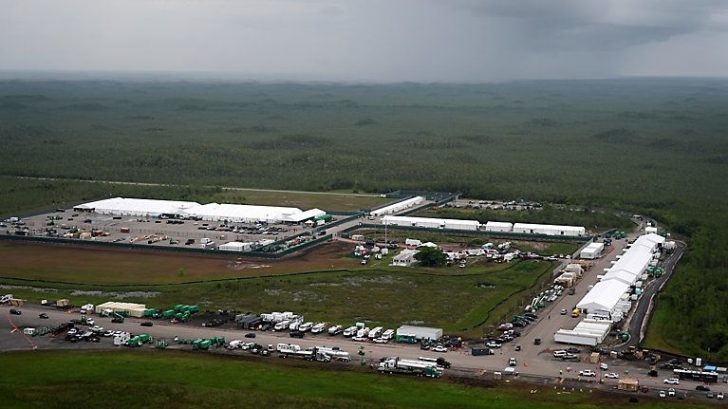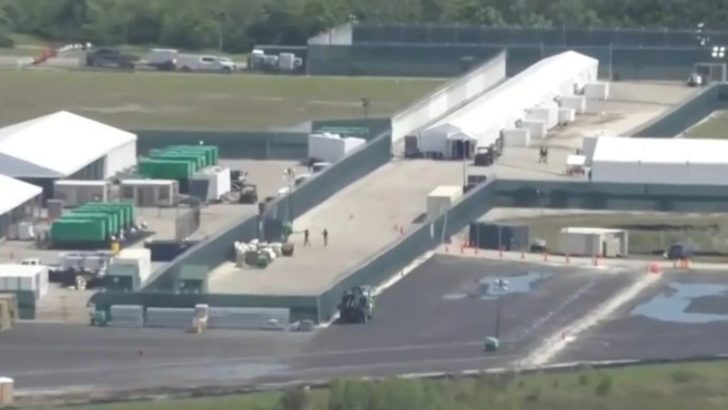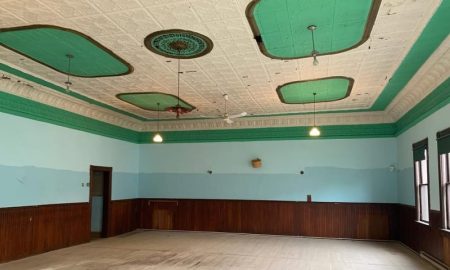
Judge Restricts Notorious ‘Alligator Alcatraz’ Operations in Landmark Ruling

The infamous immigration detention center known as “Alligator Alcatraz” just hit a legal wall. A federal judge dropped a major ruling that puts the brakes on any new construction and bars the site from accepting new detainees. For now, the facility stays open, but just barely.
This all started with a lawsuit from environmental groups and the Miccosukee Tribe. They say the detention center was thrown together in the heart of the Everglades without following the rules. It thrashes sensitive wetlands and puts endangered species at risk. Judge Kathleen Williams agreed! She called out both state and federal authorities for skipping a proper environmental review.
What Is ‘Alligator Alcatraz’
“Alligator Alcatraz” is the nickname for a detention center stuck out in the Florida Everglades, near the Dade-Collier airport. Picture FEMA trailers, tents, fences, and mosquitoes. It was slapped together fast and meant to hold thousands of undocumented migrants as part of Florida’s immigration crackdown.

The News / Governor Ron DeSantis even admitted that ‘Alligator Alcatraz’ was picked to make escape nearly impossible.
The idea? Make it miserable enough to scare people from coming here in the first place.
Judge Williams didn’t shut “Alligator Alcatraz” down completely. But she pulled the plug on any expansion. No new buildings, no new detainees, and a 60-day deadline to strip away all the temporary gear that made the place run: Generators, sewage systems, gas lines, and even lighting and fences.
The only upgrades allowed now are those that improve safety or cut down on environmental harm. That is it. With all that critical gear gone, it is unclear how the place can stay open. You can’t run a prison in the swamp without power or toilets.
Why It Got to This Point?
The ruling centers on one big question: Did the state and federal governments break environmental law? The environmental groups say yes. They argue that the project tore through protected wetlands, home to rare plants, endangered Florida panthers, and other wildlife.
At least 20 acres were paved over. That asphalt could mess with water flow and spread pollutants deep into the Everglades. Billions of dollars in restoration work might be at risk.
Federal law requires a full environmental review for major government projects. It is called NEPA, and it is non-negotiable. But both Florida and the feds claimed it didn’t apply in this case.
Their excuse? Florida built and ran the facility, so NEPA wasn’t triggered. The feds said they were just “advisors.” Florida called it a solo project. Judge Williams wasn’t buying it.

E! Online / One lawyer said they presented overwhelming evidence that convinced the judge this was the right call. The Miccosukee Tribe said they have fought for their land before, and they will keep doing it to protect the Everglades.
She said this was clearly a joint effort. The feds requested the facility, funded it, and staffed it with deputized ICE officers. As she put it, “If it walks like a duck, quacks like a duck, and looks like a duck, then it is a duck.” Translation? This is a federal operation, and NEPA does apply.
The Ruling Bags Mixed Reactions
However, not everyone was clapping. Homeland Security called the ruling “activist” and accused the judge of blocking efforts to deport dangerous criminals. They argued the land had been developed for years and claimed the ruling was political.
Governor DeSantis was furious. He called the ruling rigged and promised to keep pushing his immigration agenda. He is already talking about opening a second facility, which he is calling “Deportation Depot.” Florida has filed an appeal.
“Alligator Alcatraz” has a long list of complaints. Detainees describe disgusting conditions, like worms in food, broken toilets that leak sewage, and unbearable heat when the AC fails. Some go days without showers or access to medicine.
More in Latest News
-
`
How the Black Market Ticket Touts Are Sabotaging Football Safety
The black market for Premier League tickets is exploding, and it’s putting fans and football safety at risk. A recent BBC...
October 1, 2025 -
`
Why Drew Brees Thinks Bo Nix Could Be Sean Payton’s Dream QB
Bo Nix has a big fan in Drew Brees, and it is not just because they have thrown a few passes...
September 24, 2025 -
`
Boxing Legends Mike Tyson & Floyd Mayweather Set for Fight Amid Health Concerns
Mike Tyson is stepping back into the ring again, and this time it is with Floyd Mayweather. Two of boxing’s biggest...
September 17, 2025 -
`
Indiana Fever Player Caitlin Clark Turns Down $15 Million BIG3 Offer!
Caitlin Clark just said no to a $15 million offer from Ice Cube’s BIG3 league. The offer came not long after...
September 10, 2025 -
`
The Forgotten Military Leagues of All-Americans During World War II
Football didn’t stop for the war. In fact, it got even weirder. During World War II, football found a second home...
August 27, 2025 -
`
How Floyd Mayweather Schooled Canelo Álvarez and Made $42 Million
Floyd Mayweather walked into the ring in September 2013 with the calm confidence of a man who already knew the ending....
August 20, 2025 -
`
Hong Kong Hails Saudi Super Cup and Cultural Treasures in Historic Tourism Push
Hong Kong is turning up the heat this August, as Saudi Arabia brings a double dose of energy to the city:...
August 13, 2025 -
`
Floyd “Money” Mayweather’s Flight Company Sued for $136k in Unpaid Fuel
Floyd Mayweather is in the ring again, but this time it is a legal one. His private jet company, TBE Aviation...
August 6, 2025 -
`
World’s Oldest Surviving Basketball Court May Help Boost Small Town Tourism
Basketball may be a global sport. But its roots run deeper in Canada than most people think. In the small border...
July 30, 2025















You must be logged in to post a comment Login